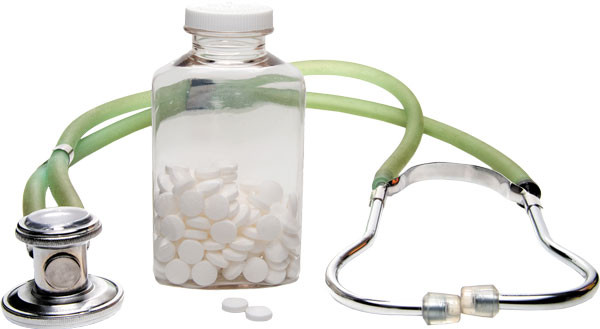
Respiratory health harms often follow flooding: Taking these steps can help

Tips to leverage neuroplasticity to maintain cognitive fitness as you age

Can white noise really help you sleep better?

Celiac disease: Exploring four myths

What is prostatitis and how is it treated?

What is Cushing syndrome?

Exercises to relieve joint pain

Think your child has ADHD? What your pediatrician can do

Foam roller: Could you benefit from this massage tool?

Stepping up activity if winter slowed you down
Stroke Archive
Articles
Drug no better than aspirin for stroke prevention
A study found that the drug ticagrelor (Brilinta) was no better than aspirin at preventing stroke among people who had a mild stroke or a transient ischemic attack (TIA), which mimics stroke-like symptoms. However, ongoing research may show benefits in using the drug in combination with aspirin.
Why you should always have aspirin on hand
This old standby may not be your first choice for pain relief, but it still has an important role in disease prevention and first aid.
Image: Thinkstock
We have a lot to thank aspirin for. It's cheap and plentiful. It does a good job of relieving pain and bringing down fevers. It has also been shown to reduce the risk of heart attack, stroke, and colon cancer. It can even stop heart attacks and strokes in their tracks. In fact, if you're in your 50s or 60s, you may want to think about taking a low-dose aspirin every day.
After evaluating the results of scores of studies, in April 2016 the U.S. Preventive Services Task Force (USPSTF) recommended that women and men ages 50 through 69 who have a 10% risk of a heart attack or stroke in the next 10 years take 81 milligrams (mg) of aspirin daily. Under the previous recommendations—which, were different for men and women—daily low-dose aspirin was advised for women ages 60 through 79 who were at increased risk for cardiovascular events. The recommendation was revised to reflect a new method of calculating the risk of heart attack and stroke and of increased risk of bleeding in older people.
Loneliness and isolation raise risk for stroke and heart disease, study suggests
Loneliness and isolation are associated with an increased risk for developing coronary artery disease (CAD) and stroke.
Loneliness has same risk as smoking for heart disease
Loneliness and social isolation raises your risk of heart attack, stroke, and even early death, says a new study. The risk was similar to light smoking or obesity.
Prompt attention to “ministrokes” may reduce risk of subsequent stroke
Getting immediate attention for symptoms of a transient ischemic attack can minimize the risk of a subsequent stroke.
Heart attack and stroke risk may rise briefly after a bout of shingles
A painful, blistering rash known as shingles may temporarily increase a person's risk of a stroke or heart attack, according to a study in the Dec. 15, 2015 PLOS Medicine. Also known as herpes zoster, shingles results from a reactivation of the virus that causes chickenpox, which most adults had during childhood.
For the study, researchers analyzed the records of more than 67,000 people ages 65 and older diagnosed with shingles and either a heart attack or stroke from 2006 through 2011. They then compared the rates of cardiovascular events before and after a shingles attack. In the first week after a shingles diagnosis, the risk of a stroke rose 2.4 times and the risk of a heart attack increased 1.7 times compared with baseline risk.
Your stroke prevention action plan
Image: Bigstock
You get the most bang for your buck from keeping blood pressure in the normal range, but don't skip the other things.
Many tasks are required to run a household. There are groceries to shop for, broken things to fix, and windows to wash. But you need to prioritize: it makes no sense to worry about the weeds in the garden if the mortgage payment is overdue.
How old is your heart?
To use the online heart age calculator, the only numbers you need are your height, weight, and blood pressure reading.
Most Americans are not as young at heart as they might like to believe. More than three in four adults have a "heart age" that's greater than their chronological age, according to federal health officials.
Research we're watching: Working overtime may raise stroke risk
If you're "leaning in" by putting in extra hours on the job, you may be gaining gender equality that you don't want—the same stroke risk as your male colleagues. A recent analysis indicates that women who work 55 hours or more per week have a 30% higher risk of having a stroke than those working standard hours, making them just as likely to have a stroke as their male counterparts.
Image: Thinkstock |
The analysis, published online Aug. 20, 2015, by The Lancet, was conducted by European public health re-searchers. It involved data from over 600,000 women and men enrolled in long-term observational studies in Europe and the United States. It was the first such analysis of the relationship between working long hours and stroke. The researchers noted several factors that might have contributed to the elevated stroke risk, including the additional stress of balancing the extra work hours, inactivity, long periods of sitting, and ignoring stroke warning signs.
Longer work hours may boost stroke risk
Image: Thinkstock
Research we're watching
People who work long hours may face a higher risk of stroke, according to a study published online Aug. 20, 2015, by Lancet.
Researchers pooled data from 17 studies from the United States, Europe, and Australia that followed more than 528,000 workers for an average of just over seven years. None of the participants had cardiovascular disease when they signed up for the studies.

Respiratory health harms often follow flooding: Taking these steps can help

Tips to leverage neuroplasticity to maintain cognitive fitness as you age

Can white noise really help you sleep better?

Celiac disease: Exploring four myths

What is prostatitis and how is it treated?

What is Cushing syndrome?

Exercises to relieve joint pain

Think your child has ADHD? What your pediatrician can do

Foam roller: Could you benefit from this massage tool?

Stepping up activity if winter slowed you down
Free Healthbeat Signup
Get the latest in health news delivered to your inbox!
Sign Up









